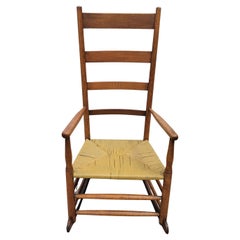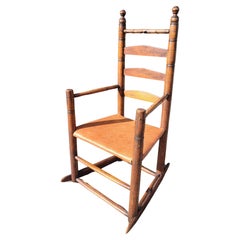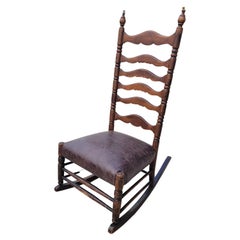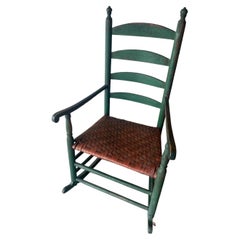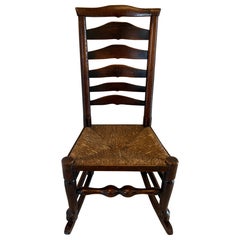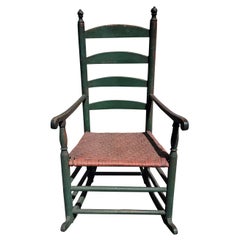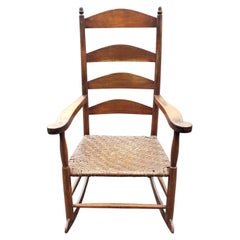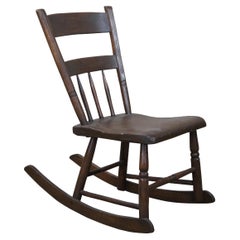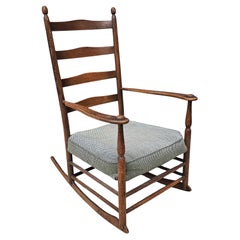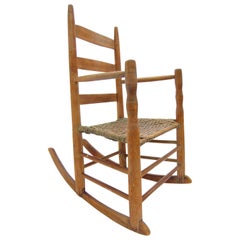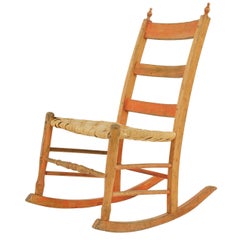Ladder Back Rocking Chair
Antique Mid-19th Century American Adirondack Rocking Chairs
Rush, Wood
Antique Late 18th Century American Adirondack Rocking Chairs
Leather, Wood
Antique 1850s American Adirondack Rocking Chairs
Leather, Wood
Antique 19th Century American Adirondack Rocking Chairs
Rattan, Wood
Antique 18th Century English Rocking Chairs
Oak
Antique 19th Century American Adirondack Rocking Chairs
Wood
Mid-20th Century American Native American Rocking Chairs
Reed, Walnut
Early 20th Century Country Rocking Chairs
Oak
20th Century American Arts and Crafts Rocking Chairs
Cane, Oak
Early 20th Century American American Colonial Rocking Chairs
Upholstery, Chestnut
Recent Sales
Antique Early 19th Century American Antiquities
Cane, Wood
Antique 1880s American Rocking Chairs
Pine
Antique Late 19th Century American Rocking Chairs
Fabric, Wood
Antique 19th Century American Rocking Chairs
Maple
Antique 18th Century English Chairs
Oak
Antique 19th Century American Chairs
Wood
Antique 18th Century and Earlier American Rocking Chairs
Pine
Antique 18th Century and Earlier American Rocking Chairs
Vintage 1910s English Arts and Crafts Rocking Chairs
Rush, Oak
Antique 19th Century American Rocking Chairs
Oak
Antique 19th Century American Rocking Chairs
Antique Late 19th Century American Adirondack Rocking Chairs
Paint, Wood
Antique 19th Century American Rocking Chairs
Antique Early 1800s American Shaker Rocking Chairs
Maple
Vintage 1960s Scandinavian Modern Dining Room Chairs
Teak
Antique 1870s American Shaker Rocking Chairs
Maple
Early 20th Century American Country Rocking Chairs
Leather, Wood
Antique Early 1800s American Shaker Rocking Chairs
Rush, Wood
Antique 19th Century American Rocking Chairs
Maple, Cane
Antique 1830s American American Colonial Rocking Chairs
Rush, Wood
20th Century Danish Scandinavian Modern Dining Room Tables
Oak
People Also Browsed
Antique Mid-19th Century American Adirondack Armchairs
Wood, Cane
Ladder Back Rocking Chair For Sale on 1stDibs
How Much is a Ladder Back Rocking Chair?
Finding the Right Rocking-chairs for You
The phrase “rocking chair” didn’t find its way into the dictionary until the mid-18th century. While most of the sitting furniture that we use in our homes originated in either England or France, the iconic rocking chair is a quintessentially American piece of furniture.
A Philadelphia cabinetmaker’s bill for a proto-rocking chair issued in 1742, which identified the seat as a “Nurse Chair with rockers,” is the earliest surviving evidence of this design’s humble beginnings. The nurse chair was a low side chair intended for nursing women, so giving it a soothing rocking motion made sense. Rocking chairs, which saw a curved slat affixed to the chairs’ feet so that they could be literally rocked, quickly gained popularity across the United States, garnering a reputation as a seat that everyone could love. They offered casual comfort without the expensive fabrics and upholstery that put armchairs out of many families’ budgets.
Rocking chairs are unique in that they don’t just offer a place to rest — they offer an opportunity to reminisce. The presence of one of these classic pieces stirs up our penchant for nostalgia and has the power to transform a space. They easily introduce a simple country feel to the city or bring the peaceful rhythm of a porch swing into a sheltered sunroom. Although craftsmen took to painting and stenciling varieties of the chairs that emerged in New England during the 19th century, the most traditional rocking chairs are generally unadorned seats constructed with time-tested materials like wood and metal. As such, a minimalist vintage rocking chair can be ushered into any corner of your home without significantly disrupting your existing decor scheme or the room’s color palette.
In the decades since the first rocker, top designers have made the piece their own. Viennese chair maker Michael Thonet produced a series of rockers in the middle of the 19th century in which the different curved steam-bent wood parts were integrated into fluid, sinuous wholes. Mid-century modernists Charles and Ray Eames added wooden rockers to their famous plastic shell armchair, while Danish designer Frank Reenskaug opted for teak and polished beech, introducing pops of color with small cushions (a precursor to the bold works that would follow in the 1970s and 1980s).
No matter your personal style, let 1stDibs pair you with your perfect seat. Deck out your porch, patio or parlor — browse the vintage, new and antique rocking chairs in our vast collection today.
- 1stDibs ExpertApril 5, 2022Ladder back chairs have a timeless design that was popular in several eras. Early examples date back to the Middle Ages. The wooden chairs became very popular in colonial America and England during the 17th century. Shop a range of antique and vintage ladder back chairs on 1stDibs.
Read More
20 Inviting Dining Rooms Perfectly Arranged for Entertaining
Top interior designers show — and tell — us how to create delectable spaces for hosting dinner parties.
Nobody Puts This Sunny Sofa in a Corner
With its plush cushions, cane details and dazzlingly colorful back, it’s inviting from every angle.
The 21 Most Popular Mid-Century Modern Chairs
You know the designs, now get the stories about how they came to be.
Fred Rigby’s Modular Seating Can Be Configured in So Many Handy Ways
The plush Cove Slipper 2.5 Seater sofa is just one of many convenient combinations from the London-based maker.
This Chubby-Chic Quilted Stool Stands on Its Own Two Feet
Sam Klemick's cool stool is edgy, cozy and environmentally sustainable all at once.
Is Lionel Jadot the Willy Wonka of Upcycled Belgian Design?
From his massive collaborative workshop in a former paper factory, the designer concocts funky furniture from disused materials, as well as luxe hotel interiors like the new Mix Brussels.
Rock Your Cares Away on This Sunny Hand-Crocheted Swing
The boho-chic Enchanted Forest Swing, handmade by marginalized women from Turkey and Syria, is uplifting in every way.
Learn Why Designer Maarten Baas Set This Charles Rennie Mackintosh Chair on Fire
What happens when you do something to a piece of furniture that you shouldn’t? It becomes an entirely new object.
